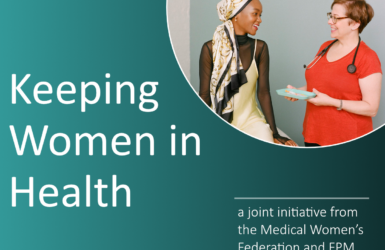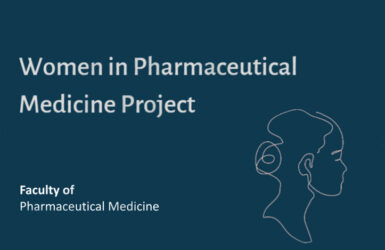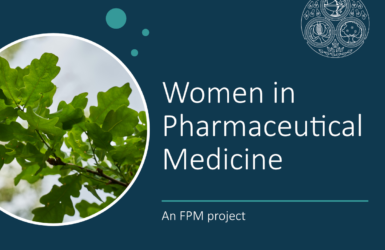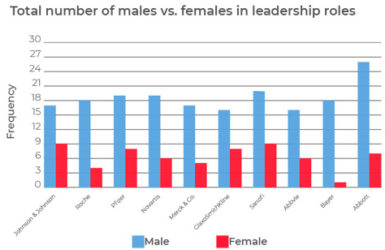Keeping Women in Health, a joint initiative with the Medical Women’s Federation
Posted on: Thursday 11 February 2021
Author: FPM
On the UN International Day of Women and Girls in Science, FPM, in partnership with the Medical Women’s Federation (MWF), is launching a joint initiative Keeping Women in Health.
Despite many advances in recent decades, women still make up the minority of senior leadership positions in the NHS, academia and the pharmaceutical industry. In addition, women, particularly women of child bearing age and pregnant women, are actively excluded from clinical trials. Clinical development programmes in women’s health make up a very small proportion of global clinical development programmes and investment in women’s health lags behind other fields. This joint initiative hopes to address many of these issues and lead to changes in policy and leadership in the field.
Read the full statement below:

![]()
Keeping Women in Health
A joint initiative from the Medical Women’s Federation (MWF) and the Faculty of Pharmaceutical Medicine (FPM)
11th February 2021
Following last year’s Ada Lovelace Day and to coincide with UN International Day of Women and Girls in Science, celebrating women in science, technology, engineering and medicine, MWF and FPM are proud to announce the launch of Keeping Women in Health. This joint project will develop initiatives supporting the role of women’s health in the maintenance of population health, the importance of women in a healthy, resilient society, and raise awareness of the need for investment in women’s health, women in healthcare, health innovation and biomedical research.
For millennia women have been the cornerstone of healthcare provision, from the ‘wise women’ who knew the healing properties of herbs to the local midwife who delivered all a village’s babies, women have kept society healthy. As the science of medicine evolved, the knowledge of the wise women was belittled, even considering them witches, and eventually, even childbirth became the domain of the male physician.
It has taken many decades for women to achieve any degree of success in healthcare, medical science and clinical research and yet women’s health is still not a priority for health services and clinical research. (The link between the words ‘hysteria’ and ‘hysterectomy’ as its cure in the Victorian era, has taken a lot of work to overcome!) Women still lag behind men in medical leadership positions both in healthcare and in research, both academic and pharma.
The proportion of women clinical academics decreases with seniority, with women holding only 19% of Professorial positions, 37% of Reader/Senior Lecturers positions and 44% of Lecturers. This contrasts with women making up 47% of all licensed doctors and well over half of those in training. (Medical Schools Council 2018). Pharma has a similar pattern with women accounting for only 25% of leadership teams; with only one female CEO among the top 10 pharmaceutical companies.
(Source: https://resultshealthcare.com/insight/women-in-healthcare-leadership/2019)
The lack of women in senior positions in the life sciences and investment in women’s health has led to lack of innovation in medicines for women. As of January 2021 only six of big pharma companies are listed as running clinical trials in new drug women’s health programmes in 20 conditions (Source: http://pharma.globaldata.com/Drugs/ Feb 2021). These include uterine fibroids, endometriosis, polycystic ovary syndrome and menopausal symptoms, conditions which affect a significant proportion of women. Pregnancy presents a separate challenge with pregnant women generally excluded from clinical trials. In 2020, 80% of Covid-19 studies actively excluded pregnant women (Source: Taylor et al. Lancet Global Health 2020; https://doi.org/10.1016/ S2214-109X(20)30484-8)
Our initiative will promote the value of women’s health to society and a nation’s economic prosperity, celebrate the successes of women in healthcare and biomedical research, support the women healthcare innovators of the future, and seek ways to attract, develop and keep women in the health sciences.
A series of workshops, including case studies, will be held to cover a range of topics. These will include:
- The enrolment of women of all ages, including pregnant and breastfeeding women, in clinical research and the potential risks and benefits of this approach
- Stimulating investment in the women’s health sector including globally affordable treatments
- Why women are fundamental to maintaining a healthy population and therefore a healthy (and prosperous) society
- The role of women and women’s health in rebuilding after the global pandemic
- The value of women healthcare professionals in delivering innovation in clinical research and healthcare.
Dr Flic Gabbay, Vice President, FPM
Professor Neena Modi, President MWF
Get involved
- Register your interest in this programme and to receive updates (external link)
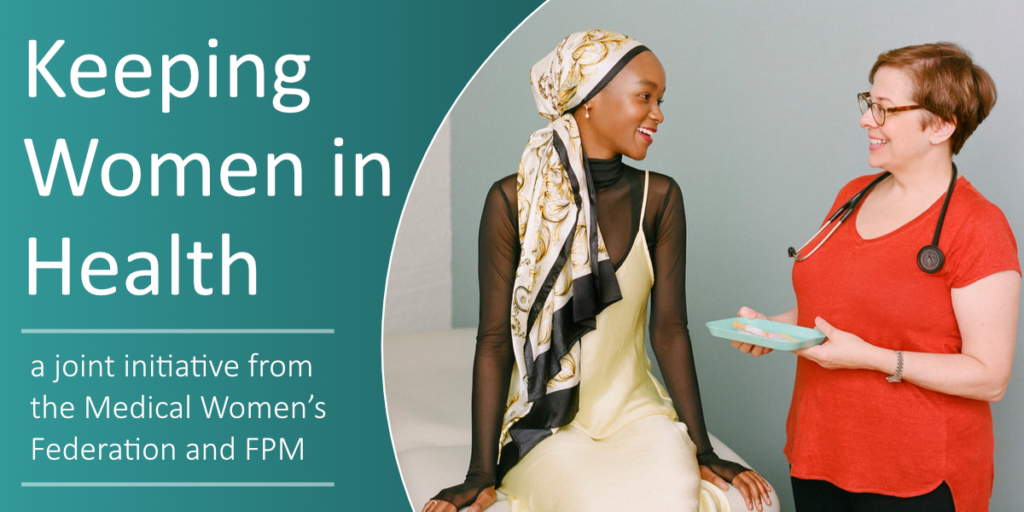
See more of our Women in STEM posts
About the Medical Women’s Federation
The Medical Women’s Federation was founded in 1917 and is today the largest and most influential body of women doctors in the UK. They are the voice of UK medical women on medical issues. The MWF welcome and support all women doctors including those who identify as trans or gender diverse.
- Improving working conditions: the MWF are passionate about improving the working lives of women doctors and aim to promote the personal and professional development of women in medicine.
- Amplifying our voices: As the largest body of women doctors in the UK, the MWF aims to represent and amplify the voices of medical women on medical issues.
- Networking and support: The MWF provides a unique network of women doctors in all branches of the profession, and at all stages from medical students to senior consultants. We aim to achieve real equality by providing practical, personal help from members who know the hurdles and have overcome them.

